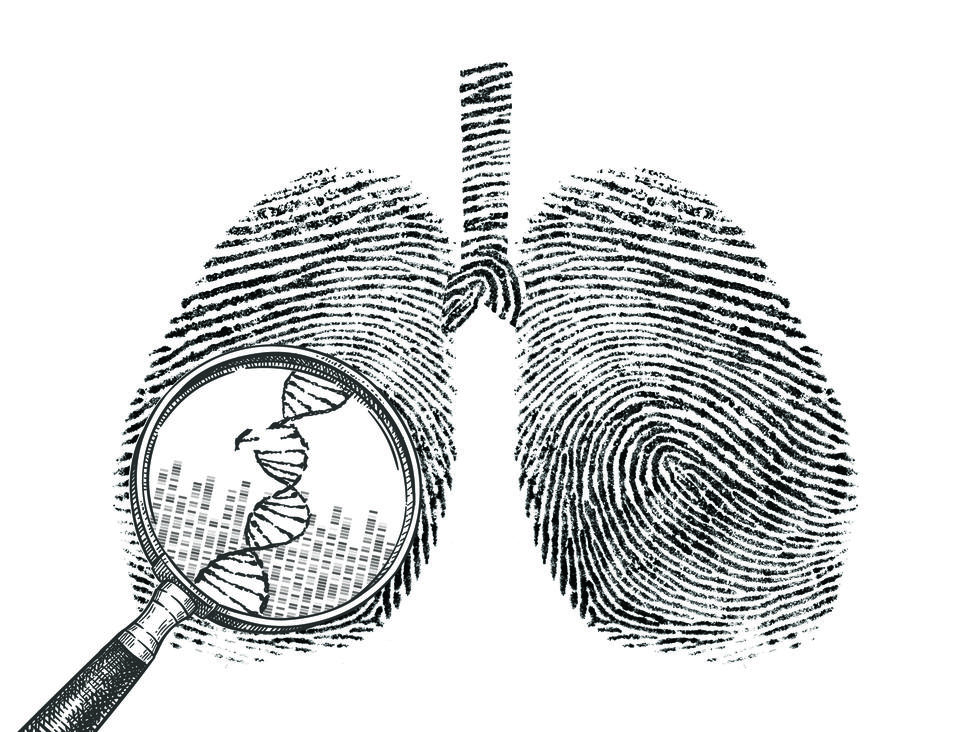Overview
Sherlock-Lung is a comprehensive study that aims to trace lung cancer etiology in never smokers by analyzing genomic data in tumor and surrounding lung tissue.
Study Team
Lead Investigators
Maria Teresa Landi, M.D., Ph.D., senior investigator, Integrative Tumor Epidemiology Branch & senior advisor for genomic epidemiology
Tongwu Zhang, Ph.D., Earl Stadtman investigator, Biostatistics Branch
Background & Purpose
Lung cancer is the leading cause of cancer-related deaths worldwide. Every year, more than 2 million people around the world are diagnosed with the disease. Most people who develop lung cancer have a history of tobacco smoking, but 10% to 20% of people who develop lung cancer have never smoked. Lung cancer in never smokers occurs more frequently in women and at an earlier age than lung cancer in smokers.
Environmental risk factors, such as exposure to secondhand tobacco smoke, radon, air pollution, and asbestos, or having had previous lung diseases, may explain some lung cancers among never smokers, but scientists still don’t know what causes the majority of these cancers.
Study Design
The study will include 2,000 never-smoking lung cancer patients, a subset (n=~300) with “special exposures,” such as indoor and outdoor air pollution, radon, asbestos, previous lung diseases, etc. The remaining ~1700 cases will come from the “general population,” with unknown exposures to lung cancer risk factors.
Whole genome sequencing, whole transcriptome, genome-wide methylation, and microbiome data are being analyzed to characterize the genomic landscape of lung cancer in never smokers (LCINS) and to identify exogenous and endogenous processes involved in lung tumorigenesis. Analysis of the tumor cells of origin, normal-to-tumor evolution, and tumor microenvironment will be conducted in a subgroup of the cases also using single/oligo cell sequencing approaches. The molecular landscape will be integrated with histological and radiological features to develop a more refined classification of LCINS and provide insights into prognosis and treatment strategies.
Select Findings & Publications
Fine particulate air pollution (PM2.5) is linked to higher overall DNA mutational burden, increased prevalence of TP53 mutations, and shorter telomeres. Aristolochic acid from medicinal herbs leaves a mutational signature in the lung cancer genome.
- Díaz-Gay M and Zhang T et al. The mutagenic forces shaping the genomic landscape of lung cancer in never smokers. Nature. 2025.
A majority of lung cancer tumors in never smokers arise from the accumulation of mutations caused by natural processes in the body. These insights will help unlock the mystery of how lung cancer arises in people who have no history of smoking and may guide the development of more precise clinical treatments.
- Landi MT, Synnott NC, et al. Tracing Lung Cancer Risk Factors Through Mutational Signatures in Never Smokers: the Sherlock-Lung Study. American Journal of Epidemiology. 2021.
- Zhang T, Joubert P, Ansari-Pour N, et al. Genomic and evolutionary classification of lung cancer in never smokers. Nature Genetics. 2021.

